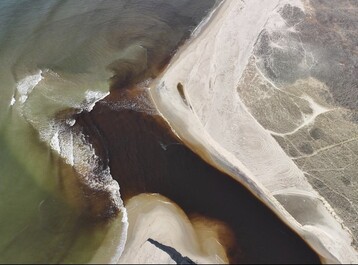Sesachacha And Hummock Ponds Opened To Ocean
Nantucket Current •

Sesachacha Pond and Hummock Pond were opened to the Atlantic Ocean this week by the town’s Natural Resources Department to improve the health of two of Nantucket's largest water bodies.
Hummock Pond was opened on Tuesday, while Sesachacha Pond was breached on Thursday.
The openings of Sesachacha and Hummock Pond are done twice every year to lower nitrogen levels, raise salinity through the exchange of brackish pond waters with the high quality offshore waters, and allow the entry of marine species, including herring, blue crab and other species.

According to the Natural Resources Department: “Two of Nantucket’s Great Ponds, which are ponds greater than 10 acres in size, Sesachacha Pond and Hummock Pond are maintained as part of an estuarine system by a spring and a fall breaching of the barrier beach. The ponds have breached naturally and receive ocean over wash, but the scheduled breachings are mechanically opened during designated tide conditions and with appropriate weather conditions. The barrier beach separates the brackish pond from the marine waters of the Atlantic Ocean. Brackish water is a blend of freshwater and of saltwater. Each Pond is breached to lower its nitrogen levels and raise its salinity through the exchange of brackish pond waters with the high quality offshore waters.
Pond openings are also to allow the entry of marine species, including herring, blue crab and other species. Studies of Sesachacha Pond in the late 1980's indicated that periodic tidal exchange was required to help stabilize the ecology and these results were reiterated in the recently completed Massachusetts Estuary Plan for each pond. Data has indicated that not conducting the breaching could lead to the salinity levels of the pond dropping, and nutrient levels rising to levels that do not support the species of plants, animals, and invertebrates within the ponds.”